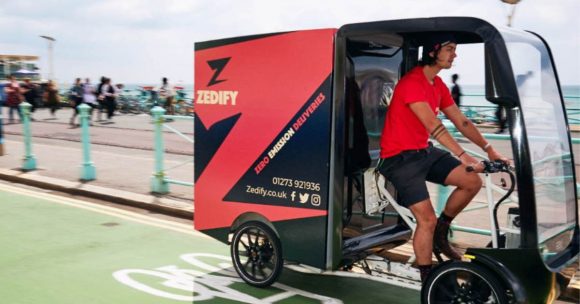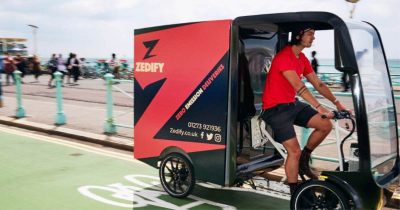Zedify, the UK delivery service, has received an additional $5 million (£4 million) investment from Barclays Sustainable Impact Capital, Mercia Ventures, and Green Angel Ventures.
Currently, Zedify delivers in Brighton, Bristol, Cambridge, Edinburgh, Glasgow, London, Manchester, Norwich, and Plymouth, Zedify plans to expand to 51 UK towns and cities in the next five years.
Founded in 2018, Zedify has partnered with popular retail brands like Zara, parcel carriers, and independent businesses. They are offering more sustainable last-mile deliveries by using cargo bikes in densely populated cities. Compared to electric vans, these bikes save over 80% of CO2 emissions per kilometer.
Brands want to transform last-mile logistics
This funding will help Zedify expand into more UK cities, including a new Midlands hub launching in October. The company plans to improve its technology and grow its teams of riders, sales, and customer care staff. Zedify aims to create 80 new jobs, with 20 in the new Midlands hub, and to triple its turnover in the next year.
Rob King, co-founder and CEO of Zedify, says: “We are seeing a real appetite from leading retail brands and UK-wide businesses looking to transform their last mile logistics and invest in more sustainable delivery models, which is why we have ambitious plans to triple in size this year. This investment will be paramount to that growth, helping us scale to meet the needs of our rapidly expanding customer base.”
Low-carbon transport
Gavin Chapman, co-dead of principal investments at Barclays, explained that reaching net zero emissions is complex, particularly for the logistics industry. He said that Zedify understands the need for hyper-local delivery models and low-carbon transport to reduce pollution and decarbonize the industry in UK cities.
Here’s why parcel carriers could be introducing e-bikes into their fleet:
- Lower cost: Companies save on fuel. E-bike purchases are also easier on the budget, while delivery vans can be expensive.
- Traffic congestion: E-bikes can weave through traffic and reach destinations faster, especially in peak traffic. Delivery vans cannot avoid congestion, especially with a heavy load of parcels.
- Reduce carbon footprint: A sustainable way of transporting goods means a company reduces its carbon footprint – a ‘greener’ environment benefits the community.
Last-mile delivery
Ruth Coleman from Mercia Ventures says Zedify is making last-mile delivery more sustainable. “Its business model – which includes its own zero-emission bikes, hyperlocal microhubs and its unique technology – helps to set it apart from competitors and ensure high levels of customer satisfaction. This latest funding will enable it to continue its rapid growth,” says Coleman.
NOW READ: Pakistan’s Rider Logistics masters the art of last mile delivery
Photo Credit: Zedify
About the author
Sharl is a qualified journalist. He has over 10 years’ experience in the media industry, including positions as an editor of a magazine and Business Editor of a daily newspaper. Sharl also has experience in logistics specifically operations, where he worked with global food aid organisations distributing food into Africa. Sharl enjoys writing business stories and human interest pieces.











